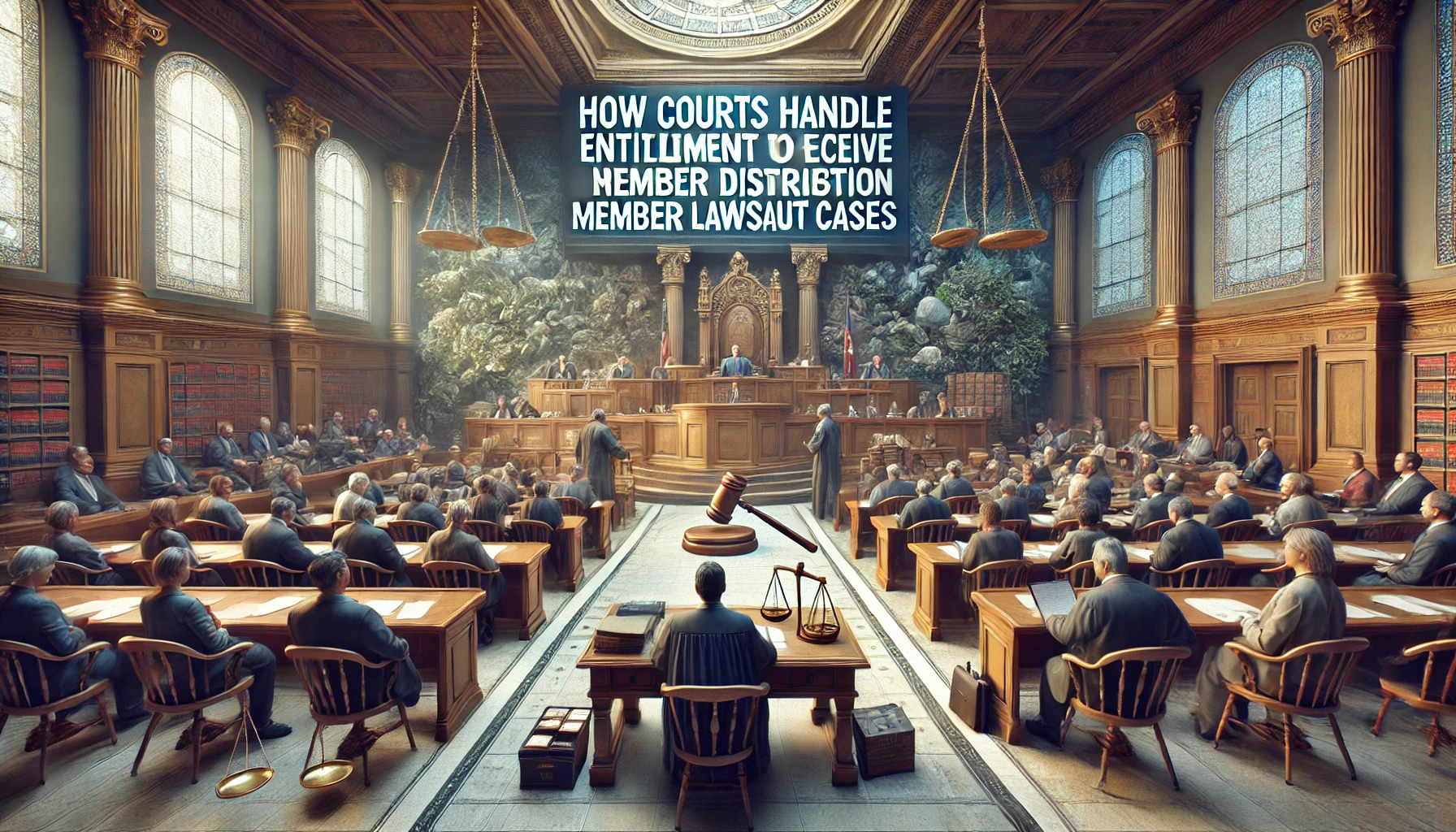Disputes over entitlement to receive distribution member lawsuits are increasingly common, especially in business entities like LLCs. These cases often arise when members disagree over their rightful share of profits or assets during legal proceedings.
Understanding the legal framework surrounding entitlement to receive distribution member lawsuits is critical. It helps members safeguard their financial interests and navigate the complexities of distribution rights.
Courts often evaluate operating agreements, financial records, and the nature of the claims to determine a member’s entitlement. Knowing your rights and legal remedies can significantly influence the outcome of such lawsuits.
By addressing these issues proactively, members can protect their interests and resolve disputes effectively, ensuring a fair distribution of resources.
Understanding the Basics of Member Distribution Disputes
Member distribution disputes often arise from disagreements regarding the allocation of profits or assets in a business. These disputes are particularly significant when the issue of entitlement to receive distribution member lawsuits comes into play, as members seek to enforce their rights through legal channels.
One common cause of disputes is the lack of clarity in operating agreements, which often leads to misunderstandings about how distributions should be made. These misunderstandings may escalate if members feel that their entitlement has been ignored or unfairly diminished.
Another key factor is financial mismanagement. When managing members fail to properly account for or allocate funds, other members may view this as a violation of their rights, triggering legal action.
Key Causes of Member Distribution Disputes
- Unclear or outdated operating agreements.
- Financial discrepancies or mismanagement.
- Deliberate withholding of rightful distributions.
Addressing these disputes early, through negotiation or mediation, can help avoid escalation into lawsuits, preserving both relationships and financial stability.
When Does Entitlement to Receive Distribution Member Lawsuit Apply?
A member lawsuit concerning entitlement to receive distribution becomes relevant when a member is denied their rightful share of profits or assets, often due to a breach of agreement or unfair practices. These lawsuits aim to enforce the financial rights of members within a business entity.
This type of lawsuit commonly applies in the following scenarios:
- A member is excluded from distributions despite fulfilling their obligations.
- Operating agreements are misinterpreted, leading to unequal allocation of funds.
- Mismanagement or fraudulent practices result in denied distributions.
Table: Triggers for Entitlement to Receive Distribution Member Lawsuits
| Trigger | Example Scenario |
| Breach of Agreement | Failure to distribute profits per terms. |
| Financial Mismanagement | Misuse of company funds or hidden expenses. |
| Unequal Treatment | Favoritism in profit allocation. |
Understanding these triggers can help members identify when their rights are being violated and take appropriate legal steps to protect their interests.
Key Legal Considerations in Member Distributions
Legal considerations in entitlement to receive distribution member lawsuits are primarily guided by operating agreements, which define the terms and conditions for distributing profits among members. These agreements are legally binding and form the basis for court decisions in disputes.
State laws also play a crucial role, especially in the absence of an operating agreement. Many jurisdictions have default rules that dictate equal distribution unless otherwise specified, ensuring fairness in profit-sharing.
Fiduciary duties are another critical legal aspect. Managing members are obligated to act in the best interest of all members. Breaching this duty, such as by withholding distributions or misusing funds, can lead to lawsuits.
Additionally, tax considerations often complicate these cases. Members may face tax liabilities on distributions they never received, further fueling disputes and increasing the stakes in litigation.
Proper legal advice and well-drafted agreements are essential to navigating these complexities and protecting member rights.
Common Scenarios Leading to Entitlement Disputes Among Members
Disputes over entitlement to receive distribution member lawsuits often arise from various situations, all tied to perceived or actual breaches of member rights. One common scenario involves a lack of clarity in operating agreements, which creates confusion about profit-sharing rules.
Another frequent trigger is financial favoritism, where certain members receive disproportionate distributions, leaving others feeling excluded or undervalued. This can occur intentionally or due to oversight but often results in litigation.
Key Scenarios Leading to Disputes
- Misallocation of funds to specific members.
- Delayed distributions during financial hardships.
- Disagreements over allowable deductions before distribution.
External factors, such as economic downturns, can also lead to disputes. For example, a company might withhold distributions to manage cash flow, but members relying on these funds may perceive it as a violation of their entitlement.
Open communication, regular financial reporting, and adherence to operating agreements are crucial in preventing and resolving these disputes effectively.
How Courts Handle Entitlement to Receive Distribution Member Lawsuit Cases

Courts play a pivotal role in resolving disputes involving entitlement to receive distribution member lawsuits by interpreting contracts and applying relevant laws. Judges often begin by examining the operating agreement, which serves as the foundation for determining how distributions should be handled.
When an operating agreement is absent or unclear, courts turn to state default laws for guidance. Many states require equal distribution of profits unless explicitly stated otherwise in the company’s governing documents. This ensures fairness in the absence of specific agreements.
Courts also evaluate the actions of managing members. If a member is accused of breaching fiduciary duties, such as mismanaging funds or withholding distributions, the court may impose penalties and enforce the rightful distribution.
Key Factors Courts Consider
- Validity and clarity of the operating agreement.
- Evidence of financial mismanagement or breaches of duty.
- State laws governing LLCs or partnerships.
Judgments often include financial compensation, revised distribution terms, or penalties for violations, ensuring fair outcomes for all parties involved.
The Role of Operating Agreements in Resolving Member Distribution Issues
Operating agreements are essential in resolving disputes over member distributions. These documents outline the terms, conditions, and processes for profit-sharing, ensuring that all members have a clear understanding of their rights and obligations.
A well-drafted operating agreement includes provisions for the timing and amount of distributions, as well as procedures for resolving disputes. By addressing potential conflicts proactively, these agreements reduce the likelihood of lawsuits.
Table: Key Clauses in Operating Agreements for Distributions
| Clause | Purpose | Example Provision |
| Distribution Schedule | Sets timing and frequency of payments | Quarterly profit distributions |
| Profit Allocation Rules | Defines how profits are divided | Based on ownership percentage |
| Dispute Resolution Clause | Outlines methods for resolving disagreements | Mediation before litigation |
Courts often prioritize the terms of the operating agreement over state default laws, emphasizing its importance. Regularly updating and reviewing the agreement can help address evolving business needs and prevent future disputes.
Protecting Your Rights in Distribution-Related Lawsuits
Protecting your rights in entitlement to receive distribution member lawsuits requires a proactive approach. The first step is to thoroughly understand the governing documents, such as the operating agreement and state laws, to identify any violations.
Gathering evidence is crucial for building a strong case. Financial records, communications, and meeting minutes can demonstrate instances where your rights have been infringed, such as delayed or denied distributions.
Engaging experienced legal counsel is another key step. An attorney specializing in business disputes can help interpret contracts, identify breaches, and represent your interests in court or mediation.
Tips for Protecting Your Rights
- Document all financial transactions and communications.
- Request timely access to company records if discrepancies arise.
- Use legal remedies like injunctions to prevent further violations.
Taking timely action not only ensures a fair outcome but also protects your reputation and financial interests within the business entity.
Exploring the Financial Implications of Member Disputes

Financial disputes over entitlement to receive distribution member lawsuits can have far-reaching implications for both the individuals involved and the business as a whole. Unresolved disputes often lead to financial strain, legal costs, and damaged relationships among members.
For the company, these disputes may result in operational disruptions and potential loss of investor confidence. Legal proceedings can be expensive and time-consuming, diverting resources from core business activities.
Chart: Costs Associated with Member Disputes
| Type of Cost | Example |
| Legal Fees | Attorney charges, court filing fees |
| Operational Disruptions | Delayed projects, reduced team efficiency |
| Financial Losses | Withheld profits, penalties, or judgments |
For individual members, financial implications include missed distributions and potential tax liabilities. Members may be taxed on their share of profits, even if the funds were withheld, creating additional financial burdens.
Strategies for Securing Entitlement to Receive Distribution Member Lawsuit Outcomes
Securing favorable outcomes in entitlement to receive distribution member lawsuits requires careful preparation and strategic planning. The first step is ensuring that all financial and legal documents, such as operating agreements and financial statements, are well-organized and readily available.
Legal representation plays a critical role. Engaging an attorney experienced in business litigation ensures proper presentation of your case, especially when dealing with complex financial evidence or contractual disputes.
Proactive communication with other members can sometimes prevent escalation. Attempting mediation or negotiation before litigation may result in quicker, less costly resolutions while preserving professional relationships.
Key Strategies
- Thoroughly understand the terms of the operating agreement.
- Collect evidence of breaches, such as withheld distributions or mismanagement.
- Use alternative dispute resolution methods, like arbitration or mediation.
By adopting these strategies, members can strengthen their position in court and ensure their entitlements are recognized.
Lessons from Precedent Cases Involving Member Distributions
Precedent cases provide valuable insights into how courts handle entitlement to receive distribution member lawsuits. These cases often highlight the importance of clear operating agreements and transparent financial practices.
For example, courts have repeatedly ruled in favor of members when operating agreements are specific about distribution terms. Ambiguities, on the other hand, often lead to prolonged litigation and unfavorable outcomes for all parties.
Precedent cases also underscore the significance of fiduciary duties. In instances where managing members were found to have acted in bad faith or misused company funds, courts have awarded compensation and penalized the violators.
Lessons from Case Studies
- Detailed agreements reduce legal risks.
- Courts prioritize fairness and fiduciary responsibility.
- Proper documentation strengthens a member’s position.
By studying these cases, members and businesses can learn to structure their agreements and operations to avoid similar disputes.
Challenges Faced in Proving Entitlement to Distributions in Lawsuits
Proving entitlement in distribution-related member lawsuits can be challenging due to the complexity of financial evidence and legal arguments involved. A common hurdle is the lack of a comprehensive operating agreement, which leaves courts to rely on default laws or subjective interpretations.
Another challenge lies in gathering evidence of financial mismanagement or wrongdoing. Members must often demonstrate how distributions were withheld or unfairly allocated, which requires access to accurate financial records.
Key Challenges
- Lack of transparency in financial reporting.
- Misinterpretation of ambiguous agreements.
- Difficulty in proving intentional withholding of distributions.
Additionally, delays in filing lawsuits can weaken a member’s case. Courts may view a lack of timely action as acceptance of the status quo, reducing the chances of a favorable outcome.
Legal Remedies for Denied Entitlement to Receive Distribution Member Lawsuit Claims

When members are denied their rightful distributions, legal remedies can help enforce their entitlement. Courts often require the offending party to compensate the affected member, including interest on withheld amounts.
Members may also seek injunctive relief, preventing the company from further withholding distributions or misusing funds. This remedy ensures immediate protection while the case proceeds.
Table: Common Legal Remedies in Distribution Lawsuits
| Remedy | Description |
| Financial Compensation | Payment of withheld distributions |
| Injunctive Relief | Court orders to prevent further violations |
| Punitive Damages | Penalties for bad faith or breaches |
In severe cases, courts may dissolve the business or appoint a receiver to manage financial operations. These remedies aim to restore fairness and accountability within the entity.
Future Developments in Member Distribution Entitlement Cases
The landscape of entitlement to receive distribution member lawsuits is evolving, with emerging trends likely to shape future disputes and resolutions. One notable development is the increasing reliance on digital financial records and blockchain for transparent profit-sharing.
Courts may also adopt stricter standards for operating agreements, emphasizing the need for clear and detailed clauses to prevent ambiguities. Businesses are being encouraged to update these agreements regularly to reflect changing circumstances.
Additionally, alternative dispute resolution (ADR) methods, such as mediation and arbitration, are becoming more prevalent. These methods offer faster, less adversarial solutions compared to traditional litigation.
Predicted Trends
- Enhanced focus on financial transparency and accountability.
- Growth in ADR usage for resolving disputes.
- Technological integration for tracking distributions.
By staying informed about these developments, members can better protect their rights and adapt to the changing legal and business environment.
Conclusion
Disputes over entitlement to receive distribution member lawsuits are complex but manageable with the right approach. Understanding the legal frameworks, operating agreements, and fiduciary obligations is essential for resolving these issues effectively and ensuring fairness among members.
Courts rely heavily on evidence and clear documentation to determine rightful entitlements. Members can strengthen their position by maintaining detailed financial records, ensuring transparency, and seeking timely legal advice when disputes arise.
Proactively addressing potential conflicts through well-drafted agreements and alternative dispute resolution methods can save time, reduce costs, and preserve relationships. As legal and business landscapes evolve, staying informed about developments in distribution entitlements will be critical for members and businesses alike.

